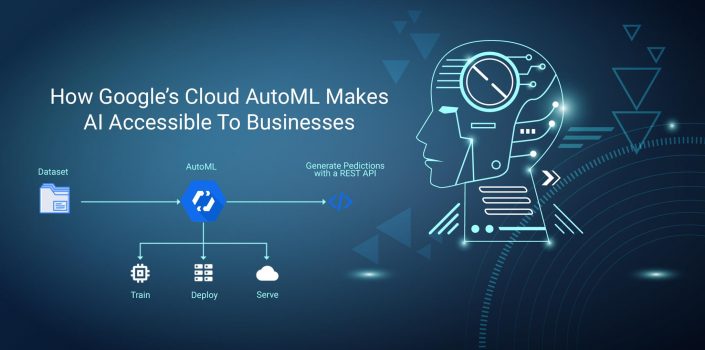"How And Why Should U Go For Node.js As Your Backend"
"3 IIoT (Industrial Internet of Things) Implementation Challenges"

Artificial intelligence is never again going to remain the mystery sauce of giant technology companies. Google laid out how it is bringing artificial intelligence to developers, as well as integrating more AI capabilities throughout its cloud products. So developers can utilize these AI cloud services to give the best user experience.
Google I/O 2018 kicked off with a key theme of AI for everyone. In the current year's I/O, Google exhibited that AI cannot simply help to make items more valuable, they additionally rethink to cool new user experiences. Here is a brief synopsis of Google's featured declarations made so far on AI, that may intrigue developers and businesses.
Google Cloud CEO, Diane Greene noted that Google is heavily investing in two key areas: AI and security. While Google is putting resources into security because it is customer's "number one stress" and it's putting resources into AI since it is the "number one chance."
"At Google Cloud AI, our goal was to lower the barrier of entry and make AI possible to the largest possible community of developers, researchers, and businesses," said Fei Fei Li, chief scientist at Google Cloud AI and Director of the Stanford Artificial Intelligence Lab, in a press conference outlining AutoML.
"We believe Cloud AutoML will make AI experts more productive, advance new fields in AI and help less-skilled engineers to build powerful AI systems they previously only dreamed of" Fei-Fei Li, wrote in a blog post.
"Currently, only a handful of businesses in the world have access to the talent and budgets needed to fully appreciate the advancements of ML and AI," said Jia Li, head of research and development for Google's cloud AI unit.
Google announced a new product as part of its Cloud venture offering: Cloud AutoML, depends on giving machine learning-based answers for all organizations, regardless of whether they have mastery in the field or not. Auto ML stands for automated machine learning, where the whole model can be created automatically and a business can give its own data-set to have a custom ML show for themselves.
Google’s Cloud AutoML released for the vision API will let businesses create models which rely on the vision-based machine learning. In a video-call interaction, Google Cloud’s Chief Scientist of AI/ML Dr. Fei Fei Li explained that, when it comes to machine learning, it is still a fairly expensive investment. “Machine learning and artificial intelligence is a rare expertise, and we require high talent and investment for this. Currently, there are around one million data scientists and at best, AI services can be used by these people. But for developers, AI can be an expensive resource,” Dr. Fei Fei Li pointed.
This is the reason why Google is moving towards automated models of machine learning, where a business can simply convey its whole data-set to the Cloud AutoML Vision API and make an AI framework for their necessities. “Our aim is to scale AI for more people. AI building blocks for text, speech, video, vision can be provided by our machine learning APIs. However, these building blocks only offer generic solutions. To solve specific problems, can be complex and time intensive,” Dr. Fei Fei Li explained.
Google’s Cloud AutoML suite is aimed at making the advantages of artificial intelligence widely accessible to all developers, even they don’t have a machine learning background.
Google is focusing on the center ground of developers, taking note of that "Many have needs beyond what's accessible with pre-trained models, however, don't have the right stuff or assets to build their own custom solutions."
Alongside AutoML Vision, all three are currently accessible out in the open beta.
In the interim, after announcing the third-age of Cloud TPUs at I/O 2018, developers would be able to get the new liquid-cooled processors in alpha. These Tensor Processing Unit cases have eight times execution of the earlier age, with speeds achieving 100 petaflops.
Different updates to Google's core machine learning APIs include:
Google's developing cloud business is trying to convey artificial intelligence to the majority, not simply to the specialists.
Nonetheless, for the individuals who need to build their own particular custom models from it, that is as of now uplifting news as it implies that the service is en route to being released in the future. Google's AI realm extends somewhat further and Google receives the rewards.